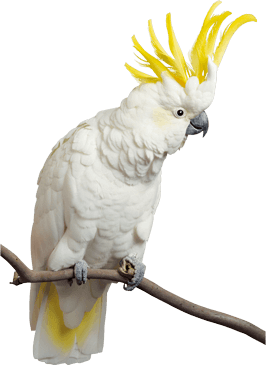Bird Care
VITAMIN D
Vitamin D is a fat soluble vitamin that is essential for normal regulation of calcium and phosphorus concentrations in the body.
When plasma calcium levels fall vitamin D stimulates release of calcium from bone, and limits calcium excretion by the kidneys. Vitamin D is also needed for the absorption of calcium from the digestive tract.
Sources of Vitamin D
Vitamin D occurs in two main forms in nature. Vitamin D2 occurs mainly in plant sources. Most seeds, especially those ripened by the sun, contain high levels of vitamin D2. Although vitamin D2 is easily used by most mammals, it is only about 1/30th as effective for birds as the other main form, vitamin D3. Vitamin D3 is found only in animal products such as eggs, milk, butter, insects, liver and cod liver oil.
The dietary requirement for vitamin D is rather confusing because of the ability of birds to produce Vitamin D3 in and on the skin under the influence of shortwave ultraviolet (UV) light. Birds excrete sebaceous material containing vitamin D3 precursors from the preen gland and from exposed skin on the legs, feet, and around the eyes. After exposure to UV rays the vitamin precursors are transformed into vitamin D3. The vitamin is then resorbed back into the body to supply the birds' vitamin D requirement.
Vitamin D deficiency is extremely rare in birds housed in outdoor aviaries, however birds kept indoors or in shaded flights and fed on a plant or seed based diet alone may require added dietary Vitamin D3. Being a fat soluble vitamin, Vitamin D can only be absorbed when there is sufficient fat in the diet. If fat absorption is poor, the amount of vitamin D absorbed will also be poor.
Many breeders use cod liver oil supplements, being an excellent source of both vitamin A and vitamin D3, but care must be taken to avoid rancidity following exposure to air. Vitamin D3 can also be given in powdered form. Some breeders add vitamin D3 powder to mashed, hard-boiled egg, or any other soft food that the birds will eat readily. Since excess Vitamin D is stored in the body, it is possible to overdose. Care should be taken, especially if you feed a complete diet and provide sunlight or full spectrum lighting, that you are not over-supplementing.
Sunlight and Vitamin D
Studies in poultry have shown that 11 - 45 minutes per day exposure to unfiltered sunlight is enough to provide adequate vitamin D to growing chickens. Birds that are exposed to direct sunlight for at least an hour a day should be able to make enough vitamin D via the skin. That is why it is recommended that cage birds are taken outside on warm, sunny days, provided there is adequate shade for the bird to move into if it becomes too warm.
Short wavelength UV rays cannot penetrate window glass, though they will go through most clear plastics. For birds maintained indoors, window glass effectively prevents vitamin D3 synthesis.
Many bird owners use artificial UV light sources to replace the regular incandescent or fluorescent light bulbs where their birds are housed. However, some full spectrum lights do not emit the intensity necessary for the formation of vitamin D3 via the skin. Even the commercial black lights, which emit a very high percentage of light in the ultraviolet range of the spectrum, may not have the intensity required for vitamin D3 synthesis. A sunlamp has sufficient shortwave UV intensity, and exposing the birds for less than an hour each day will allow them to make enough vitamin D3 to satisfy their daily requirements.
Signs of Vitamin D Deficiency
The symptoms of vitamin D deficiency in cage birds are closely related to calcium deficiency. In young growing birds, the bones become soft and pliable, unable to support the weight of the bird, or are easily broken. In hens, thin or soft-shelled eggs are a prominent symptom. Too little vitamin D results in clutches that are smaller than normal, low clutch size and poor hatchability. Embryos may have malformed or only partially formed beaks. Feathering may be affected and certain feather colours may develop abnormal blackening. Egg binding, leg weakness, paralysis and tremors are also seen.
Effects Of Excess Vitamin D
Vitamin D is also toxic in excess. Toxicity can be produced relatively easily with over-supplementation of concentrated sources of vitamin D. Excess vitamin D causes leeching of calcium from the bones, and abnormal calcium deposits in the soft tissues of the body. In birds, this can take the form of kidney damage caused by the calcification of the kidney tubules. Symptoms include increased thirst, diarrhoea and general weakness.
